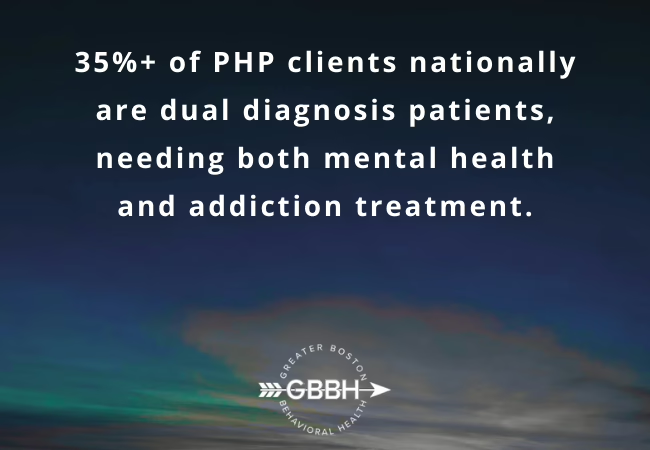Mental health recovery is not a linear path—it’s a series of steps forward, pauses, adjustments, and reinforcements. For many people struggling with anxiety, depression, trauma, or co-occurring disorders, finding the right level of care can be confusing and overwhelming.
You might be too stable for inpatient treatment, yet still struggling too much for weekly outpatient therapy to make an impact. That’s where Partial Hospitalization Programs (PHP) come in—a treatment level designed specifically to bridge the gap between crisis stabilization and long-term healing.
At Greater Boston Behavioral Health, our Partial Hospitalization Program in Massachusetts plays this essential role for countless individuals each year. In this blog, we’ll walk you through what PHP is, how it fits into the mental health treatment continuum, and why it’s often the key to sustainable recovery.
The Challenge of Finding the Right Level of Care
For those in recovery from mental illness or substance use disorders, accessing the right care at the right time can determine success or relapse. Consider the following situations:
- You just left a hospital following a suicide attempt and aren’t ready to return to everyday life.
- You’ve been in weekly therapy for months, but your symptoms remain overwhelming.
- You’re experiencing mood swings, disconnection, or substance cravings—but don’t meet criteria for hospitalization.
- You’ve completed inpatient rehab but feel unprepared for independent living.
These are the exact gaps that Partial Hospitalization Programs are designed to fill.
What Is a Partial Hospitalization Program (PHP)?
A Partial Hospitalization Program is a short-term, structured, intensive treatment plan that provides hospital-level care during the day, while allowing individuals to live at home during evenings and weekends.
Clients typically attend PHP for 5 to 6 hours per day, 5 days per week, engaging in a comprehensive therapeutic environment that includes:
- Group therapy
- Individual counseling
- Psychiatric care and medication management
- Skill-building workshops
- Family therapy
- Anger Management Therapy in Massachusetts
- Relapse prevention and life planning
At our mental health treatment center in Massachusetts, PHP is a core component of our broader continuum of care, designed to stabilize, educate, and empower clients as they transition through recovery.
Where PHP Fits in the Mental Health Care Continuum
Think of PHP as the middle tier in a ladder of care. Here’s how it compares:
| Program | Intensity | Best For |
|---|---|---|
| Outpatient Therapy | Low | Mild symptoms, long-term maintenance |
| Intensive Outpatient Program (IOP) | Moderate | More structure than outpatient, 3–4 hours/day, 3–5 days/week |
| Partial Hospitalization Program (PHP) | High | Post-crisis care, dual diagnosis support, transitioning from inpatient |
| Inpatient Treatment Program | Very High (24/7) | Severe mental health crises or danger to self/others |
| Residential Treatment Program | 24/7 (Non-hospital) | Long-term therapeutic immersion in a community setting |
The Unique Role of PHP: Bridging Critical Transitions
1. Step-Down Support After Inpatient or Crisis Care
After hospitalization, patients may be stabilized physically or emotionally—but they’re rarely ready to jump back into life. PHP creates a safe, structured space to:
- Reinforce coping skills learned in inpatient care
- Monitor psychiatric medications
- Continue therapy and emotional processing
- Slowly reintroduce real-world responsibilities
Greater Boston Behavioral Health partners with inpatient treatment programs in Massachusetts and local hospitals to create seamless transitions into PHP, ensuring that no one falls through the cracks.
2. Preventing Hospitalization Through Early Intervention
PHP isn’t only for post-crisis recovery—it’s also a powerful preventative tool. For individuals experiencing worsening symptoms, emotional dysregulation, or increased substance cravings, PHP can:
- Prevent the need for hospitalization
- Stabilize mood and function before crisis hits
- Increase engagement and accountability
- Provide crisis management strategies in real time
This “step-up” approach makes PHP a proactive solution for those struggling with daily life but still stable enough to remain at home.
3. Integrated Care for Complex and Co-Occurring Conditions
Mental health rarely exists in isolation. Many individuals struggle with co-occurring disorders, such as:
- PTSD and substance use
- Depression and anxiety
- Bipolar disorder and relationship issues
- Emotional dysregulation and impulsivity
Our PHP includes mental health programs in Massachusetts that combine psychiatric care, trauma therapy, and anger management therapy in Massachusetts to create a truly integrative healing model.
Who Is PHP Best For?
You may be a good fit for a Partial Hospitalization Program in Massachusetts if you:
-
Recently completed inpatient care and need a structured step-down
-
Are experiencing moderate to severe mental health symptoms
-
Need more than weekly therapy but don’t require 24/7 care
-
Are stable enough to live at home but need daily support
-
Are dealing with emotional regulation issues, such as anger or impulsivity
-
Have a dual diagnosis that requires both psychiatric and therapeutic treatment
Daily Structure in PHP: What to Expect
Routine and repetition are essential for rebuilding a life affected by mental illness. A typical day in our Partial Hospitalization Program in Massachusetts might look like this:
| Time | Activity |
|---|---|
| 9:00 AM | Morning check-in, goal setting, mindfulness practice |
| 9:30 AM | Group therapy (CBT, DBT, trauma-focused, or emotion regulation) |
| 11:00 AM | Psychoeducational workshop (coping skills, self-care, boundary setting) |
| 12:00 PM | Lunch and social support time |
| 1:00 PM | Individual therapy or psychiatric consult |
| 2:00 PM | Specialty group (e.g., relapse prevention, anger management therapy) |
| 3:00 PM | End-of-day reflection, planning for the evening and next steps |
This routine provides predictability, emotional processing, and personal growth—all within a safe and professionally supported setting.
How PHP Builds Long-Term Recovery
✔ Builds Consistency
A predictable routine helps reduce anxiety and re-establish daily rhythms like sleep, meals, and self-care.
✔ Promotes Emotional Stability
Daily emotional processing and therapeutic feedback help clients manage mood swings, triggers, and stress.
✔ Strengthens Life Skills
Clients learn how to set boundaries, regulate emotions, communicate effectively, and plan for the future.
✔ Connects Clients to Community
Group sessions foster connection, reduce isolation, and offer peer support.
✔ Ensures Clinical Oversight
With daily check-ins and access to psychiatric providers, clients receive ongoing support and adjustments to their treatment plan as needed.
What Comes After PHP?
Our continuum of care helps clients transition smoothly through each stage of recovery:
-
Inpatient or Residential Treatment Program in Massachusetts – for crisis-level stabilization
-
Partial Hospitalization Program – intensive daytime treatment with home-based living
-
Intensive Outpatient Program in Massachusetts – flexible support, 3–4 hours/day
-
Outpatient Therapy – long-term support for maintaining progress
We also offer alumni support and referrals to community services.
Why Choose Greater Boston Behavioral Health?
At Greater Boston Behavioral Health, we’ve built our PHP around clinical excellence and compassionate care. Here’s what makes our program unique:
- Evidence-based therapies (CBT, DBT, EMDR, mindfulness)
- Integrated medication management and psychiatric oversight
- Trauma-informed, inclusive, and LGBTQ+ affirming environment
- Smooth transitions from inpatient and residential treatment programs in Massachusetts
- Specialties in anger management therapy and emotional regulation
- Family support and discharge planning to encourage long-term recovery
As a top-tier mental health treatment center in Massachusetts, we meet you wherever you are—and help you move forward with clarity and support.
PHP as a Launchpad for Lasting Progress
Once you complete PHP, your journey doesn’t end. Our team helps you transition to the next level of care, which may include:
- Intensive Outpatient Program in Massachusetts for continued support with more flexibility
- Outpatient therapy with a dedicated clinician
- Medication follow-ups with a psychiatrist
- Peer-led support groups and alumni programming
- Vocational training, academic re-entry, or sober living coordination
PHP is a bridge—and it leads somewhere meaningful.
Conclusion
Don’t let the space between crisis and independence become a danger zone. If you or a loved one is looking for structured care after hospitalization—or needs more support than weekly therapy—our Partial Hospitalization Program in Massachusetts can provide the intensive help you need without the confinement of inpatient care.
If you’re feeling lost between crisis care and independence, know that you’re not alone. At Greater Boston Behavioral Health, our Partial Hospitalization Program in Massachusetts gives you the tools, structure, and clinical care needed to move forward—safely and sustainably. Call us today at 888.278.0716 to speak with our admissions team to request a confidential assessment. Let us help you bridge the gap—and build a life worth living.
FAQ on Partial Hospitalization Programs
What is the main purpose of a Partial Hospitalization Program (PHP)?
PHP offers intensive mental health treatment during the day while allowing individuals to return home in the evening. It bridges the gap between inpatient hospitalization and outpatient therapy by providing structure, therapy, and psychiatric care.
Who should consider a Partial Hospitalization Program?
PHP is ideal for individuals transitioning out of inpatient care or those whose symptoms are too severe for traditional outpatient therapy. It’s also recommended for dual diagnosis cases or those needing support with emotional regulation and behavioral challenges.
What conditions does PHP help treat?
PHP at Greater Boston Behavioral Health is designed for a wide range of conditions, including depression, anxiety, PTSD, bipolar disorder, substance use disorders, and emotional regulation issues such as those addressed in our anger management therapy in Massachusetts.
How is PHP different from inpatient or residential treatment?
Unlike inpatient or residential treatment, PHP does not require overnight stays. Clients attend therapy and support sessions during the day and return home afterward, offering a balance of clinical support and personal independence.
Can PHP prevent the need for hospitalization?
Yes. For individuals at risk of emotional deterioration or relapse, PHP can serve as a step-up in care to stabilize symptoms and avoid a full inpatient admission.
What happens after PHP?
Clients often transition into our Intensive Outpatient Program in Massachusetts or outpatient therapy. We also assist with long-term planning, medication management, and referrals to supportive housing, peer support, or educational programs.
How long do people stay in a PHP?
The average stay in PHP ranges from 2 to 4 weeks, depending on clinical needs. Our treatment team regularly evaluates progress and adjusts care accordingly.


